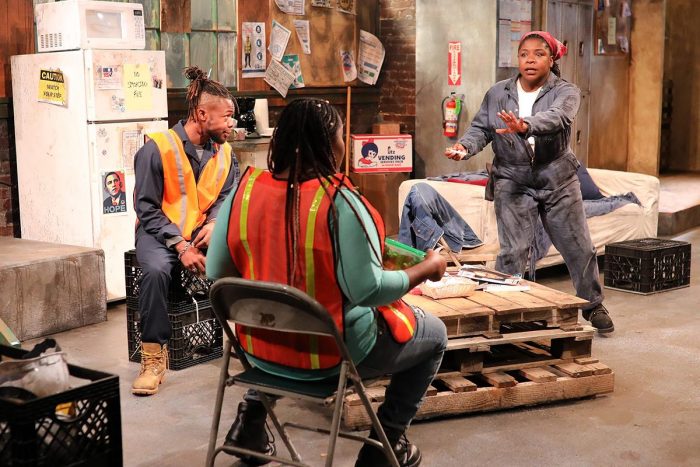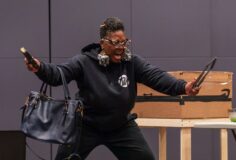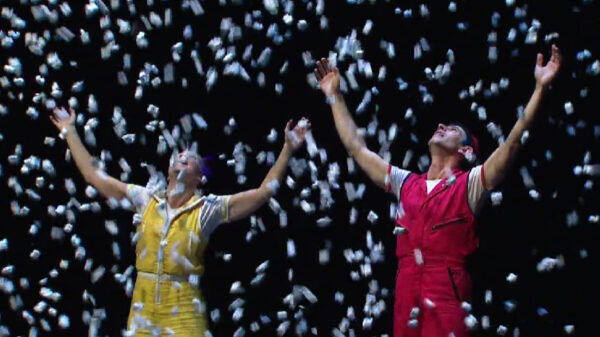Two intimate, lively shows consider the daily and extraordinary fight of the human spirit.
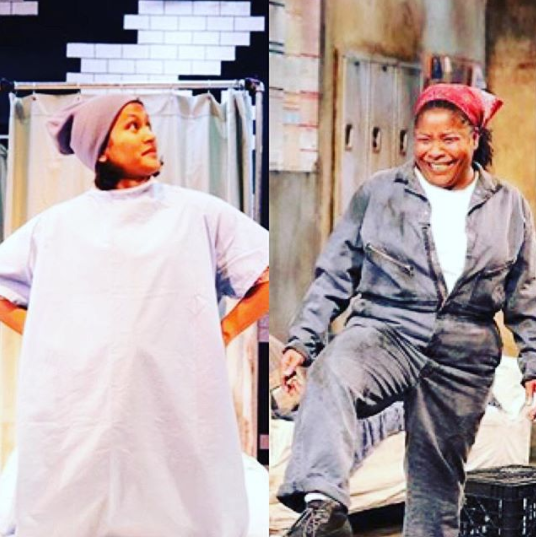
Left: A Small History of Amal, Age 7 (Forward Flux/Pratidhwani), at West of Lenin through October 6. Photo by Pankaj Luthra.
Right: Skeleton Crew, at ArtsWest through October 14. Photo by John McLellan
What does it mean to fight? The question now seems a near-constant part of American public life. Just this week, the whole country stopped and watched — a Senate committee hearing, of all things — as Dr. Christine Blasey Ford took a courageous stand, halting (for now) the nomination of an alleged predator to the nation’s highest court. Just before, an anonymous writer spoke out in an opinion piece in The New York Times, claiming to be a patriot by working inside the current administration and supposedly scuttling its more ridiculous ideas. Meanwhile, on less-watched stages, activists battle self-care vs. exhaustion from one more urgent demand, and humans all over battle daily acts of aggression and a stacked economic deck.
Into this landscape of modern American public life step two plays that consider what it means to fight, through ordinary humans showing some extraordinary traits: Skeleton Crew at ArtsWest (thru October 14), and A Small History Of Amal, Age 7, held at West of Lenin (and produced by Forward Flux and Pratidhwani) (thru October 6).
Though both intimately staged and driven by personal stories, the two plays are firmly rooted in their respective larger worlds: Skeleton Crew, in Recession-era Detroit, and Amal, in 2006 Mumbai, India.
On 7/11/2006, seven explosions rocked Mumbai, India’s largest city. The pressure-cooker bombs planted on trains on the Western line killed 209 people and injured over 700 others. The hospitals (and everyone else) were little prepared, and suddenly flush with trauma victims.
Around that same time, the people of Detroit were suffering from a prolonged, much different type of tragedy: the continued gutting of the city’s economic infrastructure. Kicking off the year in 2006, Ford announced an estimated 30,000 employee layoffs and 14 plant closures. Amid the shutdowns, some were left hanging on by a thread, with only enough workers to perform critical tasks a little bit longer. The skeleton crew.
Skeleton Crew (on now through October 14 at ArtsWest) is the third in Dominique Morrisseau’s trilogy known as the Detroit cycle, and is about, unsurprisingly, members of one of such plant crews. The characters are four workers, all of them Black, in an unnamed Detroit auto manufacturing plant that has been pared down, under continuous eyes of management and under a fog of threats of further cut-downs. Fight is core to the play’s individuals and tension; the plot follows their fights — for personal pride, interpersonal relationships, physical health, and economic survival — as they come up in discussions with one another in a break room at the plant.
Driving the characters’ urgency is the looming possibility — carried along by rumors and selective releases of information from the powers-that-be — that the plant will close down. It’s largely through this fear that we learn about each character’s backstory, quirks, struggles, successes, and relationship to each other.
We know from the start that Faye (Tracy Michelle Hughes) is the veteran of the shop — who’s done virtually every job in the plant in her 29 years there — but learn only over time how much she’s put aside in order to handle her business year after year. We know that Reggie (Alan Miller III) is the micromanaging boss who tacks up rules everywhere in the breakroom, but come to like him a bit more as we see him more — learning, for example, how his mom beamed with pride when her son landed a “button-up shirt” job — which colors in his pressure a bit more.
While the other two characters are granted a bit less depth, they serve the play well by heightening the drama and rounding out the story. They also have a way of raising important and timely questions. One of them, especially obvious in the #metoo era: should we demand that the young man Dez (Charles Wright) buzz off when rebuffed one time, then a hundred times over, or are we meant to hope that he and Shanita (Allyson Brown) hit it off? How much should we empathize with the plight of masculinity and security that Dez faces? And if it comes down to it, who among the group should protect each other, and at what cost? How should this story end?
Skeleton Crew is extraordinary in its telling of the ordinary moments in the lives of its strong and engaging characters, and ArtsWest’s sharp production does it justice. All four actors are great for their roles; Jay O’Leary’s direction is right-on; and the set design is striking immediately and serves the production well. One thing I missed was in sound design, where the supposed hum of the factory was notably silent — but that also made the factory interludes (and sounds, when they did start in) stand out more, so it’s a toss-up. Three certainties: the script, actors and overall production are all big wins.
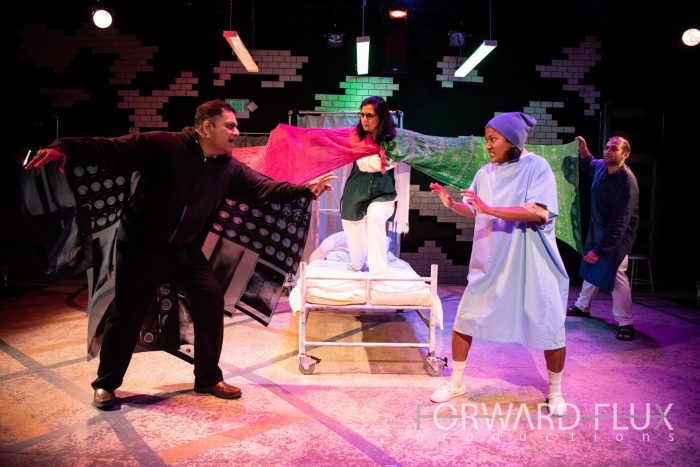
A Small History of Amal, Age 7 (Forward Flux/Pratidhwani), at West of Lenin through October 6. Photo by Pankaj Luthra.
A Small History Of Amal, Age 7, co-produced by Forward Flux and Pratidhwani, is a new play by Lindsay Joelle, in which consideration of fight is both more nuanced and more extreme. There, we’re taken to Mumbai, where 7-year-old Amal is hospitalized with a mysterious ailment. The orphaned boy is raised by his uncle, a train driver, until that fateful day when bombs rock the city.
Nowhere in Amal are the characters, or others, focused in on fighting for their lives; those fights form the backdrop, but the characters’ own quests are more for connectivity, love, protection, even adventure. And a question of fight woven into the piece (again, nuanced) is more religious-philosophical: do we fight to stay alive in our current body, or do we fight with an eye toward rebirth? (A similar version from the Christian canon might be, Do we fight to stay alive in body, or do we fight with an eye toward heaven?)
Despite its big questions and surrounding setting, Amal is a small show: just shy of 70 minutes, highly intimate in staging, and with a tenderness that permeates. This is due in large part to Nabilah Ahmed’s astonishingly good portrayal of a 7-year-old boy — the wide-eyed wonder, incessant questioning, indignant boredom, infectious joy. Ahmed has exceptional support from cast mates: Gurvinder Pal Singh (Uncle), Abhijeet Rane (Doctor), Meenakshi Rishi (Nurse), Jay Athalye (Rishi), and Varsha Raghavan (Suda); direction by Samip Raval and choreography by Wesley Fruge; and design in scenic, sound and lighting that lend to both the intimacy and the bustle.
Amal was developed last year as part of Forward Flux’s salon series. It was beautiful then, and this full production kept all of the magic of the salon version alive and then some. Then and now, audience members from India commented on how well the show brought them back. But even those who’ve never been there are transported effectively to the bustle and rhythm unlike that of Seattle. (It should be noted here too that the playwright is not Indian, and reportedly has not been to India even. That was surprising; and the South Asian co-production team, director, design team, and cast were likely crucial in this endeavor.)
To be clear: neither Skeleton Crew nor Amal is “about” the headlines: you won’t hear much on how Detroit’s shutdowns impacted the GDP or the trade deficit, or how Mumbai’s tragedy impacted India’s national security policies. These are instead about what normally escapes the headlines — what happens to those must hard-hit by the events’ immediacy, before the rest of us know enough to call them events or to label them as tragedies. The small histories. The skeleton crews.
Both shows are highly recommended — for any time, but particularly necessary now. They’re not only relevant in plot line, but human in a time humanity is sorely needed.
Skeleton Crew runs through 10/14 at ArtsWest, in West Seattle (7:30 pm Thursday-Saturday, 3 pm Sunday). Tickets $42, available here. (Financial accessibility note: ArtsWest offers discounted tickets for TPS members, and occasionally offers other discounts; bus service and free parking is available in the area. Gender-neutral bathroom policy: all restrooms are gender-neutral, multi-stall. Physical movement accessibility: ArtsWest is wheelchair accessible.)
A Small History of Amal, Age 7 runs through 10/6 at West of Lenin, in Fremont (7:30 pm Monday, Wednesday, Thursday; 8 pm Friday-Saturday). Tickets $35-45 (increase over the week), available here. (Financial accessibility note: Forward Flux offers subsidized tickets for all performances, up to $20 off regular price, based on self-identified financial need; bus service and free parking is available in the area. Gender-neutral bathroom policy: restrooms are gender-neutral, single-stall. Physical accessibility: West of Lenin’s main level is wheelchair accessible.)


